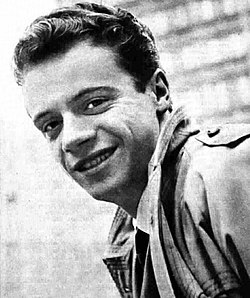Early life
Giorgio Guidi was born in Meda, at the time in the Province of Milan, Lombardy, Italy. In 1946, he moved with his family to New York City, where his father, Aurelio Guidi, found work as an opera singer under the stage name Nino D'Aurelio. He studied double bass and piano at the High School of Music and Art in New York. His stage name Dorelli was chosen in imitation of how D'Aurelio was pronounced in English.
Career
Dorelli's show business career began when he was discovered by bandleader Percy Faith, who brought him on The Ken Murray Show . He later appeared on the show By Popular Demand conducted by Robert Alda, accompanied by Paul Whiteman. He received great acclaim, with some American newspapers describing Dorelli as a "phenomenal Italian boy". However he returned to Italy in 1955 due to the expiry of his residence permit.
He debuted as singer and pianist in the late 1950s for CGD label with cover of American standards; "Lover", "What Is This Thing Called Love?", "Love Me or Leave Me" and many others.
His first success was an easy listening Latin song, "Calypso Melody", in 1957. He won the Sanremo Music Festival 1958 and 1959 in duo with Domenico Modugno, with the songs "Nel blu, dipinto di blu" (also known as "Volare") and "Piove (Ciao, ciao bambina)". His most famous songs of the period are : "Julia" (1958), "Boccuccia di rosa" ("Pink Lips", 1958), "Love in Portofino" (1959), "Lettera a Pinocchio" (1959), "Monte Carlo" (1961).
In 1962 Dorelli appeared on The Ed Sullivan Show and sang his smooth ballad "Love in Portofino" and "You're the Top" with Connie Francis and Johnny Hallyday.
As a (popular and jazz) crooner, he sang numerous songs live on television shows (mainly in the 1960s), in Italian and in English. In 1967 "L'immensità" earned Dorelli a ninth place at the 1967 edition of the Sanremo Festival. [1] In the same year he was the lead actor on the movie How to Kill 400 Duponts , a parody of the comic series Diabolik. With this role, Dorelli had a great success and inspired the character of Paperinik. Some songs of this periods are "Speedy Gonzales" (1962), "Era settembre" (1964), "Probabilmente" (1965), "Al buio sto sognando" (1966), "Solo più che mai" ("Strangers in the Night", 1966), "Arriva la bomba" (1967), "I Think of You" (1972).
His greatest success was the musical Aggiungi un posto a tavola , which was also performed at the Adelphi Theatre in London's West End in an English version entitled Beyond the Rainbow in 1978.
After a period of absence, Dorelli returned to success in the 1980s. In 1983, he played St. Philip Neri in Luigi Magni's TV film State buoni se potete . His latest feature film role is in Pupi Avati's Ma quando arrivano le ragazze (2004).
In 2007, Dorelli returned after 38 years to the stage of Sanremo as a participant with the song "Meglio così", written by Gianni Ferrio and Giorgio Calabrese, and accompanied by jazz pianist Stefano Bollani and the orchestra conducted by Ferrio.
Personal life
Dorelli had a long relationship with actress Lauretta Masiero, which produced a son, Gianluca Guidi. He then married (1972–1979) actress Catherine Spaak, with whom he had another son, Gabriele, and (1991) Gloria Guida, a former model and actress in Italian comedy movies of the 1970s, with whom he had a daughter, Guendalina.
His eyes have two different colors, a condition called heterochromia iridum .
This page is based on this
Wikipedia article Text is available under the
CC BY-SA 4.0 license; additional terms may apply.
Images, videos and audio are available under their respective licenses.
